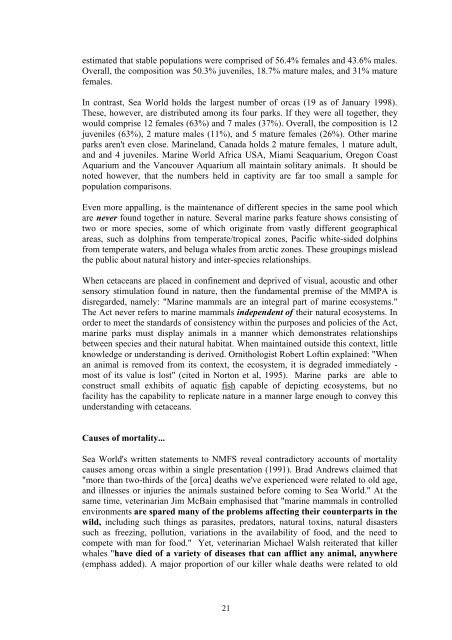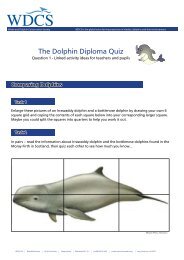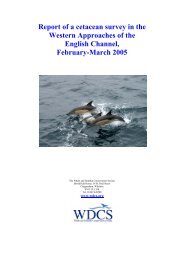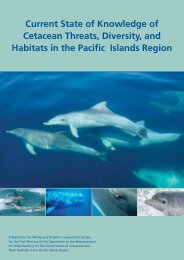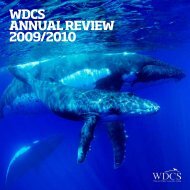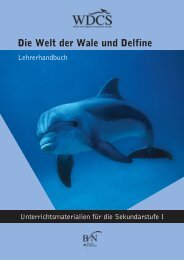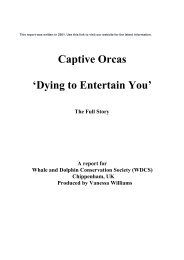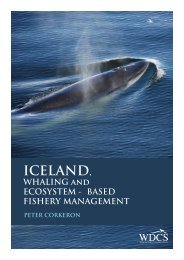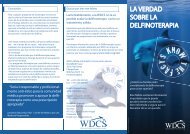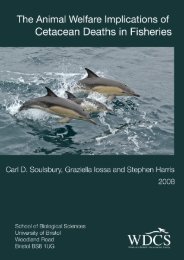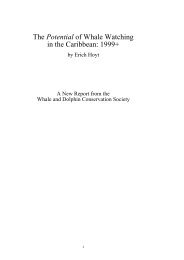Captive Cetaceans: A Handbook for Campaigners - Whale and ...
Captive Cetaceans: A Handbook for Campaigners - Whale and ...
Captive Cetaceans: A Handbook for Campaigners - Whale and ...
Create successful ePaper yourself
Turn your PDF publications into a flip-book with our unique Google optimized e-Paper software.
estimated that stable populations were comprised of 56.4% females <strong>and</strong> 43.6% males.<br />
Overall, the composition was 50.3% juveniles, 18.7% mature males, <strong>and</strong> 31% mature<br />
females.<br />
In contrast, Sea World holds the largest number of orcas (19 as of January 1998).<br />
These, however, are distributed among its four parks. If they were all together, they<br />
would comprise 12 females (63%) <strong>and</strong> 7 males (37%). Overall, the composition is 12<br />
juveniles (63%), 2 mature males (11%), <strong>and</strong> 5 mature females (26%). Other marine<br />
parks aren't even close. Marinel<strong>and</strong>, Canada holds 2 mature females, 1 mature adult,<br />
<strong>and</strong> <strong>and</strong> 4 juveniles. Marine World Africa USA, Miami Seaquarium, Oregon Coast<br />
Aquarium <strong>and</strong> the Vancouver Aquarium all maintain solitary animals. It should be<br />
noted however, that the numbers held in captivity are far too small a sample <strong>for</strong><br />
population comparisons.<br />
Even more appalling, is the maintenance of different species in the same pool which<br />
are never found together in nature. Several marine parks feature shows consisting of<br />
two or more species, some of which originate from vastly different geographical<br />
areas, such as dolphins from temperate/tropical zones, Pacific white-sided dolphins<br />
from temperate waters, <strong>and</strong> beluga whales from arctic zones. These groupings mislead<br />
the public about natural history <strong>and</strong> inter-species relationships.<br />
When cetaceans are placed in confinement <strong>and</strong> deprived of visual, acoustic <strong>and</strong> other<br />
sensory stimulation found in nature, then the fundamental premise of the MMPA is<br />
disregarded, namely: "Marine mammals are an integral part of marine ecosystems."<br />
The Act never refers to marine mammals independent of their natural ecosystems. In<br />
order to meet the st<strong>and</strong>ards of consistency within the purposes <strong>and</strong> policies of the Act,<br />
marine parks must display animals in a manner which demonstrates relationships<br />
between species <strong>and</strong> their natural habitat. When maintained outside this context, little<br />
knowledge or underst<strong>and</strong>ing is derived. Ornithologist Robert Loftin explained: "When<br />
an animal is removed from its context, the ecosystem, it is degraded immediately -<br />
most of its value is lost" (cited in Norton et al, 1995). Marine parks are able to<br />
construct small exhibits of aquatic fish capable of depicting ecosystems, but no<br />
facility has the capability to replicate nature in a manner large enough to convey this<br />
underst<strong>and</strong>ing with cetaceans.<br />
Causes of mortality...<br />
Sea World's written statements to NMFS reveal contradictory accounts of mortality<br />
causes among orcas within a single presentation (1991). Brad Andrews claimed that<br />
"more than two-thirds of the [orca] deaths we've experienced were related to old age,<br />
<strong>and</strong> illnesses or injuries the animals sustained be<strong>for</strong>e coming to Sea World." At the<br />
same time, veterinarian Jim McBain emphasised that "marine mammals in controlled<br />
environments are spared many of the problems affecting their counterparts in the<br />
wild, including such things as parasites, predators, natural toxins, natural disasters<br />
such as freezing, pollution, variations in the availability of food, <strong>and</strong> the need to<br />
compete with man <strong>for</strong> food." Yet, veterinarian Michael Walsh reiterated that killer<br />
whales "have died of a variety of diseases that can afflict any animal, anywhere<br />
(emphass added). A major proportion of our killer whale deaths were related to old<br />
21


